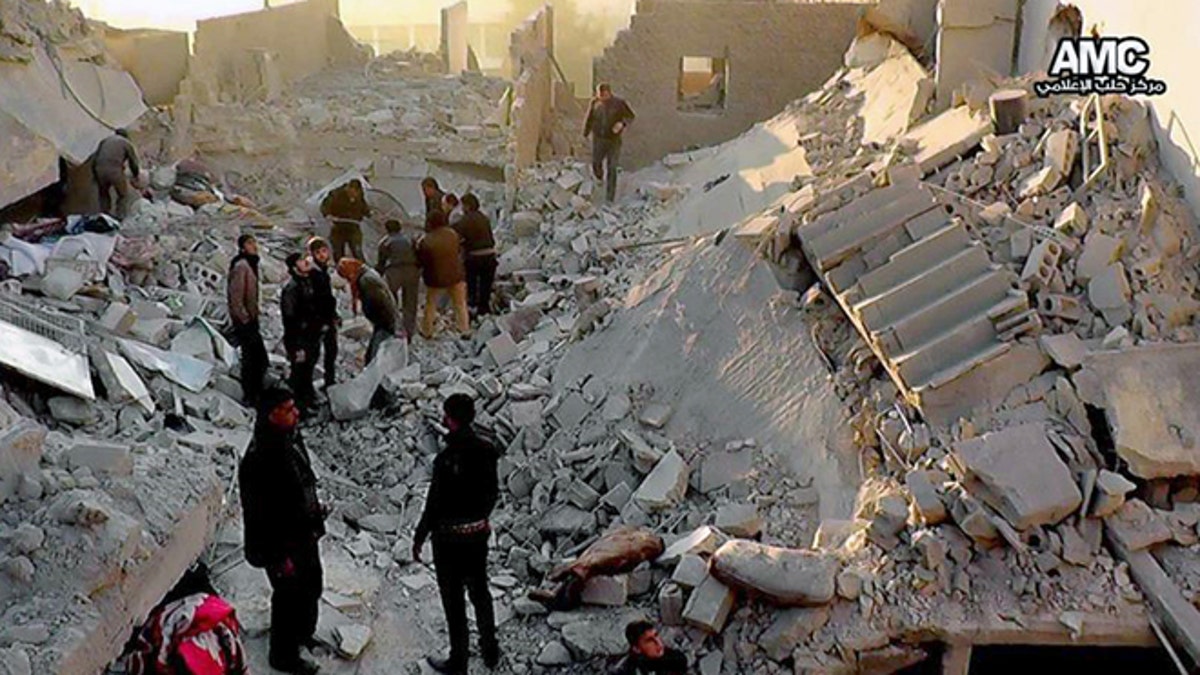
Jan. 6, 2014: In this citizen journalism image provided by Aleppo Media Center, AMC, Syrians inspect the rubble of destroyed buildings following a Syrian government airstrike in Aleppo. (AP)
Russia has once again blocked an anti-Assad resolution before the U.N. Security Council, Fox News has learned, in the latest setback ahead of Secretary of State John Kerry's mission abroad to pursue a Syria peace plan.
United Nations diplomats tell Fox News that Russia blocked the British-drafted measure condemning Syrian government attacks on the city of Aleppo with Scud missiles and explosive-filled barrels. The attacks have killed more than 700 people.
The Russian Mission to the U.N. so far has not responded to a request for comment from Fox News. The U.S. supported the British proposal, but it needed a consensus to pass.
This is the second time in a month that Russia has brushed off western efforts to condemn forces loyal to President Bashar Assad for using indiscriminate air assaults on Aleppo, killing and wounding scores of civilians.
Russia has been a consistent supporter of Assad, using its U.N. Security Council veto power to block three resolutions on Syria.
The country's stance is just one of many challenges for Kerry as he heads abroad to rally international support for ending the three-year civil war.
Hanging over Kerry's trip is the question of whether Iran should be allowed to play a role -- even an informal one -- in the talks, which begin Jan. 22. Kerry floated that idea Sunday, but both Iran and Russia are now pushing for a broader Iranian role.
Iranian President Hassan Rouhani tweeted Thursday that, in a phone call with Vladimir Putin, the Russian leader emphasized the "necessity of Iran's presence" in Geneva.
Iran has rejected Kerry's suggestion that it play a sideline role at the negotiations, calling the proposal insulting. Moscow supports full Iranian participation in the conference.
Kerry and his Russian counterpart Sergey Lavrov are scheduled to meet on Jan. 13, and are expected to discuss possible Iranian participation in the conference.
The idea has drawn skepticism among some in the U.S., considering Iran's active support for the Assad regime, and of terror group Hezbollah. The State Department has said Iran should not have a formal role unless it accepts a plan under which Assad gives up power.
Also, the main opposition group that is seeking to oust Assad still hasn't decided whether to attend the Geneva summit. The Syrian National Coalition, which is the main Western-backed Syrian opposition group, said this week it has postponed a vote on whether or not to attend.
State Department spokeswoman Jen Psaki said the coalition's indecision would not hinder preliminary discussions in Paris. She also said it was not clear whether coalition President Ahmad al-Jarba would attend the meetings.
"It shouldn't be surprising that there are disagreements within the opposition, that there are challenges within the opposition," Psaki told reporters. "Obviously, they're working through a difficult time given what's happening on the ground."
She added: "Obviously, they're a pivotal part of having a successful conference, given the negotiations. And the significance of it is having the representative body from the opposition and from the regime at the table together."
The State Department said Wednesday that Kerry leaves on Saturday for Paris, where he will join foreign ministers from 11 nations working on a Syria proposal. While there, Kerry also will update Arab League officials on his attempts to strike a peace agreement between Israel and Palestinian authorities.
While in Paris, Kerry also will meet privately with Lavrov. He has been working to bring the Assad regime to the negotiating table as officials from the U.S., Europe and Sunni-dominated nations in the Mideast have dealt with the opposition coalition, which is mostly made up of Sunni Muslim groups. Assad's Alawite religion is an offshoot of Shiite Islam, and the civil war has broken down along sectarian lines.
From Paris, Kerry heads to Kuwait City, where he will urge world officials and organizations to help raise humanitarian aid for the victims of the Syrian war.
Fox News' Jonathan Wachtel and The Associated Press contributed to this report.












































